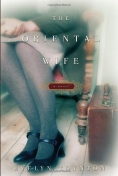BKMT READING GUIDES
The Oriental Wife
by Evelyn Toynton
Paperback : 304 pages
0 club reading this now
1 member has read this book
Introduction
The Oriental Wife is the story of two assimilated Jewish children from Nuremberg who flee Hitler's Germany and struggle to put down roots elsewhere. When they meet up again in New York, they fall in love both with each other and with America, believing they have found a permanent refuge. But just when it looks as though nothing can ever touch them again, their lives are shattered by a freakish accident and a betrayal that will reverberate into the life of their American daughter. In its portrait of the immigrant experience, and of the tragic gulf between generations, The Oriental Wife illuminates the collision of American ideals of freedom and happiness with certain sterner old world virtues.
Questions for Evelyn Toynton on The Oriental Wife
Q: What was your inspiration for the novel, particularly Louisa's character?
A: The novel is based, though loosely, on the story of my parents. I tried to imagine my mother as she had been before a botched operation shattered her life. In a way, that really meant creating the character from scratch, since I hadn't known the person my mother had been. But from old photographs and some anecdotes she told me, I had a sense of a young woman who was rather fragile but also a bit reckless, someone with a lot of romantic notions about life--and men--who was essentially not very well equipped to deal with harsh reality, nor to fight her corner. So that became the basis for Louisa's character.
Q: Many of the characters are Jewish immigrants who escaped Hitler's Germany before it was too late. Despite being physically spared the horrors of concentration camps, everyone still must cope with their survivor's guilt, albeit in a variety of ways. Did you feel it important to show the wider implication the Holocaust had to the Jewish community, even outside of Europe?
A: I'm not sure how important it is, given all the other problems in the world today, but I certainly feel there were many more lives affected by the Nazi persecutions than the figures cited for the dead would indicate. However fortunate they were to have escaped the horrors of the camps, emigrants who had experienced the nightmarish violence of Kristallnacht, after years of being demonized and turned into pariahs by the anti-Jewish laws, clearly had their own suffering to contend with as they struggled to start over in a place that was totally foreign to them. I tried to imagine, though really I can't imagine, what it was like for them to endure such a loss--of their country, their language, their right to practice their professions, as well as all their money and possessions--in middle age. Add to that their fears for the people they had left behind, and (in the case of Franz in particular) vivid memories of the terrible fate that had already befallen those they loved, and it's hard to see how they could simply put the past behind them and move on. Finally, as I tried to show with Gustav, many seemingly admirable human qualities, like sensitivity and compassion, only get in the way of the fight for survival. That still seems true for many refugees nowadays, not just the German Jews.
Q: Louisa is ostracized and isolated after the accident. However, her physical handicaps are, by today's standards, rather manageable. How do you feel the story would have changed if this had happened 50 years later?
A: I am not sure if her marriage would have survived, but certainly she wouldn't have been hidden away for thirty years, and made to feel that her handicaps (which, as you point out, weren't that severe) were something for her to feel ashamed of. At the very least, she would have received various forms of physical therapy, and could have made some kind of life for herself. I also don't think everyone concerned would automatically have assumed that she had to surrender custody of her child because of her disabilities.
Q: The character of Rolf could easily have become a villain, yet instead, the reader often feels sorry for him. Was this a conscious decision on your part?
A: Definitely. I don't think it would be so interesting to show a bad man doing a bad thing--at least it wouldn't to me. I wanted to explore what happens when a man with a strong conscience does something that goes against all his principles, and then has to live with the knowledge of it for the rest of his life.
Discussion Questions
No discussion questions at this time.Book Club Recommendations
Recommended to book clubs by 0 of 0 members.
Book Club HQ to over 90,000+ book clubs and ready to welcome yours.
Get free weekly updates on top club picks, book giveaways, author events and more








